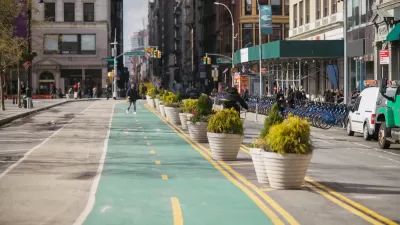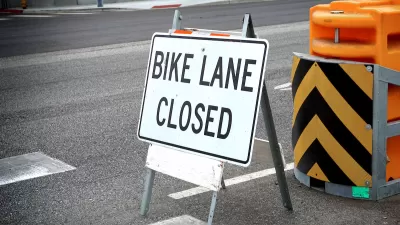New York City has been expanding its stock of bicycle lanes throughout town, but as many cyclists are finding, the lanes that are supposed to be dedicated to bikes only are often overtaken by parked cars.
On streets clogged by pollution-emitting cars, buses and trucks, New York City's quest to establish reasonably safe cycling paths by adding to its roughly 300 miles of bicycle lanes has been welcomed by cyclists. But the lanes are often battlegrounds between cyclists and drivers who seem undeterred by the clearly demarcated paths.
Although city regulations forbid cars from blocking bike lanes - a violation that carries a $115 fine - those rules are routinely ignored by drivers who use the lanes as parking spots, loading zones and places to pick up passengers. Such maneuvers have enraged cyclists who say they are unlawful, rude and dangerous.
Some bicyclists have resorted to inventive means to discourage the incursions. On a recent weeknight, nine men and women rode their bikes through the West Village on an outing - unsanctioned by the city - intended to make the lanes more prominent.
At a bike lane on Hudson Street near Christopher Street, one rider placed a cardboard stencil on the pavement, and others covered it with white spray paint. When they lifted the stencil an image of an automobile bisected by a diagonal line was left behind.
FULL STORY: Bike Lanes, Intended for Safety, Become Traffic Battlegrounds

Planetizen Federal Action Tracker
A weekly monitor of how Trump’s orders and actions are impacting planners and planning in America.

Chicago’s Ghost Rails
Just beneath the surface of the modern city lie the remnants of its expansive early 20th-century streetcar system.

San Antonio and Austin are Fusing Into one Massive Megaregion
The region spanning the two central Texas cities is growing fast, posing challenges for local infrastructure and water supplies.

Since Zion's Shuttles Went Electric “The Smog is Gone”
Visitors to Zion National Park can enjoy the canyon via the nation’s first fully electric park shuttle system.

Trump Distributing DOT Safety Funds at 1/10 Rate of Biden
Funds for Safe Streets and other transportation safety and equity programs are being held up by administrative reviews and conflicts with the Trump administration’s priorities.

German Cities Subsidize Taxis for Women Amid Wave of Violence
Free or low-cost taxi rides can help women navigate cities more safely, but critics say the programs don't address the root causes of violence against women.
Urban Design for Planners 1: Software Tools
This six-course series explores essential urban design concepts using open source software and equips planners with the tools they need to participate fully in the urban design process.
Planning for Universal Design
Learn the tools for implementing Universal Design in planning regulations.
planning NEXT
Appalachian Highlands Housing Partners
Mpact (founded as Rail~Volution)
City of Camden Redevelopment Agency
City of Astoria
City of Portland
City of Laramie





























